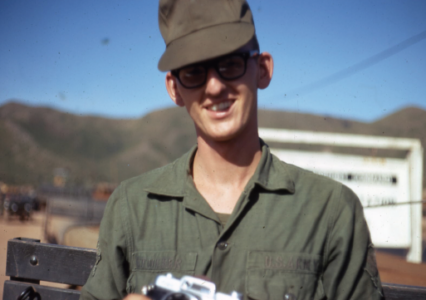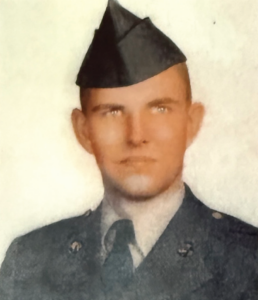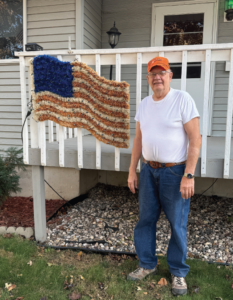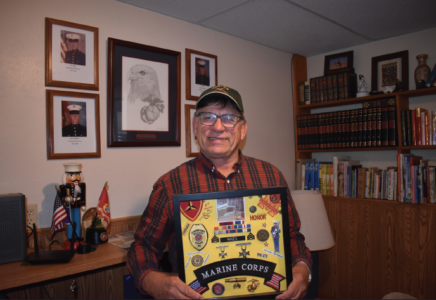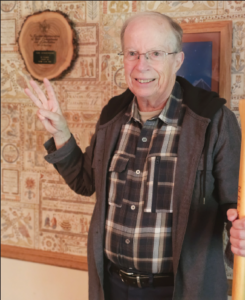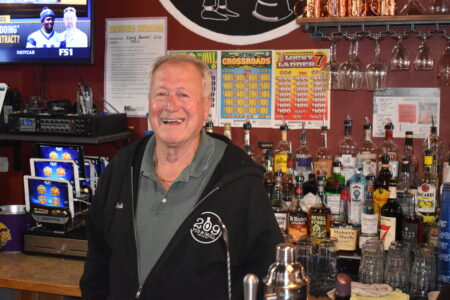Emil Rosenau’s service takes him to Germany and Vietnam
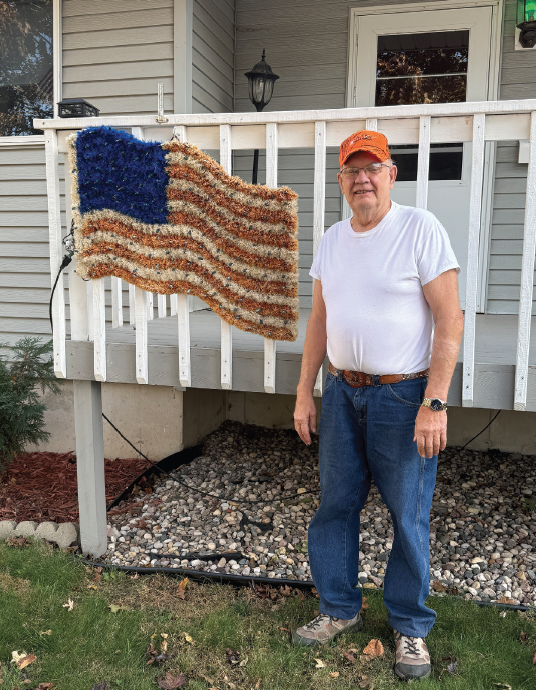
Vietnam War veteran Emil Rosenau stands outside his home in New Ulm. Rosenau worked as a mechanic in the signal unit on Long Binh Post near Saigon.
NEW ULM — Emil Rosenau’s tour of duty in the Vietnam War began in Swineford, Germany.
After graduating from Hutchinson High School in 1965 and doing farm work in the area for a year, he and a friend decided to enlist in the armed forces.
“I thought, ‘Well, what else is there to do?’ So, sure, we did it,” Rosenau said.
He and a friend signed up for the buddy plan, which encouraged friends to enlist together, and they were sent to Germany.
“He was in one unit, which was the 2nd and 39th artillery, and I was in the 1st and 10th artillery,” Rosenau said.
“It was okay,” he said. “It was like a normal job. Eight to five. I was a mechanic. Worked on trucks for two years. Then I went to track school, worked on tracks, which were our 155 howitzers.”
Then Emil got word from back home that his dad had been seriously injured.
“They notified me. Somewhere along the line, somebody from here, I think one of my siblings, contacted the Red Cross, and then the Red Cross contacted me,” Rosenau said.
“Dad had an accident over by Olivia. They didn’t think he was going to make it. I had two years in Germany, a little better than that. And then the Red Cross brought me home. Dad made it, but then at that time, I had 13 months to go, and then they sent me to Vietnam.”
Rosenau said he wasn’t expecting to be sent to Vietnam.
“I only had about a year or six months to go back in Germany, you know, so I suppose they figured, well, we ain’t going to send him back there,” he said.
It was 1968, and Rosenau was sent to San Francisco.
“And I was there for three days. You know, sunny California. Yeah, yeah. But it rained for three days. Then they put me on a plane and sent me to Vietnam,” Rosenau said.
Rosenau was stationed at Long Binh Post, which was the U.S. Army’s largest base during the Vietnam War. He was assigned to the 160th Signal Unit, where he maintained and repaired vehicles in the motor pool.
Rosenau said aside from a few times when he helped deliver radio-controlled transport vans to the outposts, he didn’t get involved in much action off the base.
“We had sandbags around our barracks and stuff and guns close by, but we were only hit once while I was there,” he said. “They did draw out the Hueys, the AH-1 Cobras, and they flew over and, well, that pretty much was it for them.”
During his year-long tour of duty in Vietnam, Rosenau opted to stay on base the entire time, rather than take a leave out of the country. For this reason, he was allowed to leave Vietnam three weeks earlier.
Rosenau said one of the highlights of his time at Long Binh was seeing Johnny Cash perform with June Carter.
“I taped it on a reel-to-reel tape I had. And I had it in my suitcase on my way home, [but] my suitcase never got here,” he said.
Rosenau said his return home went well compared to others.
“I know a lot of the guys that came back got spit on and everything else,” he said. “And that I came back into the airport in Minneapolis at like 10:30 p.m., there weren’t many around.”
After taking about 30 days “to do nothing,” Rosenau said he made his way into the working world. He worked for Walner Construction initially, then moved on to working on trailer houses, driving ready mix and grain trucks, and then back at Walner Construction, where he spent 22 years.
He then spent 14 years working for the Brown County Highway Department.
Rosenau said he has been volunteering for the past ten years with the Disabled American Veterans program. He said every Monday they collect clothing from the green drop-off containers, and then on Wednesday they load the clothing onto the Savers donation truck trailers.
“The money really helps the veterans in Brown County,” Rosenau said.
Rosenau grew up in a family of eleven children.
“I was the fourth one from the bottom,” he said. Two of his older brothers were in the service. His oldest brother was stationed in France in 1955, where he worked construction for three years.
“And then I had another brother, David, who was in. He was drafted, and he actually went through basic training and AIT [Advanced Individual Training]. And then I was sent to Germany for a year. And then he came home, and that was it,” Rosenau said.
Emil said he was thinking maybe that would be how things would go for him when he was sent to Germany.
“Yeah, well, I guess it is what it is,” he said. “The main thing is we came home.”

